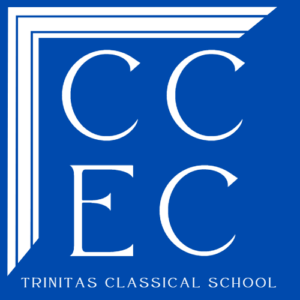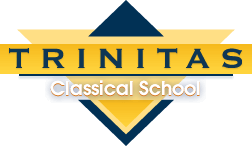 You may be thinking, “We covered the `M’ with mathematics, and the `S’ is for science, but there’s no `L’ for logic in STEM; and, where’s the technology and engineering at Trinitas? The short answer is that a rigorous education in math, science, and logic, along with an in-depth study of languages, prepares our students exceptionally well for advanced study and work in STEM fields. A substantial number of our graduates are currently studying or working in the areas of biology, neuroscience, medicine, computer science, and engineering. Continue reading to understand why.
You may be thinking, “We covered the `M’ with mathematics, and the `S’ is for science, but there’s no `L’ for logic in STEM; and, where’s the technology and engineering at Trinitas? The short answer is that a rigorous education in math, science, and logic, along with an in-depth study of languages, prepares our students exceptionally well for advanced study and work in STEM fields. A substantial number of our graduates are currently studying or working in the areas of biology, neuroscience, medicine, computer science, and engineering. Continue reading to understand why.
Simply put, the study of logic prepares our students for STEM because it is the study of reasoning itself. Logic is foundational and so especially valuable for subjects that make use of arguments and problem-solving like mathematics, computer science, engineering, and philosophy, but it is beneficial for nearly any subject because it teaches students to understand the relationship of ideas–how to define and classify terms with precision, how to draw inferences and test hypotheses, how to properly get from premises or assumptions to conclusions, and how to determine which arguments are valid and sound and which arguments are weak, muddled, or fallacious. Studying logic develops students’ minds so they are capable of more and more complex chains of reasoning and better able to discern truth from falsehood.
The importance of logic for STEM is made quite clearly in the following recommendation from a top ten computer science department*:
Summer Preparation: Logic & Formal Reasoning: Logic is the foundation of mathematics and of programming. CS 311H, which you will take during your first semester in the Turing Scholars Honors Program, will introduce you to logic as a language for thought, as well as techniques for using logic to prove theorems…The class will start at the beginning, but it will move quickly, so you will have a much easier time in the class if some of the concepts are already familiar to you.
The webpage continues with a list of books, articles, games, and puzzles for students to use over the summer to improve their logical reasoning skills and to “dispel any doubts you have about the importance of logic as a language for concise, precise communication.”
Classical schools like Trinitas distinguish themselves from other schools by teaching logic in middle school, a subject some students will only take in college and most will never study. The preparation for excellent reasoning (and so STEM skills) begins even earlier than that at Trinitas. Critical thinking is taught beginning in third grade mostly through logic games and puzzles. Similo (a cooperative deduction card game) is particularly popular. The entire school enjoys honing theirs complex reasoning skills during chess club. In grades 5/6, the students study informal fallacies. Throughout the year, they make posters that represent each fallacy, and hang them in the hallways so that others walking by can see everyday language definitions and examples. In subsequent years, students study formal fallacies using Peter Kreeft’s college-level text, Socratic Logic. They are also introduced to categorical propositions, relationships of opposition and equivalence, and syllogisms. The grade 7/8 logic class enters the rhetoric stage and is mostly dialogue with lecture to reinforce complex topics. Students are encouraged to formulate and communicate their opinions effectively, listen to other students’ opinions, and use formal and informal argumentation to resolve disputes. They are introduced to formal debate.
The effect of foundational and integrated learning in classical education prepares our students well for advanced study in any subject, including STEM. Logic and English and Latin grammar, subjects no longer taught in most other schools, are particularly important. As Dorothy Sayers writes in The Lost Tools of Learning:
“I will say at once, quite firmly, that the best grounding for education is the Latin grammar. I say this, not because Latin is traditional and mediaeval, but simply because even a rudimentary knowledge of Latin cuts down the labor and pains of learning almost any other subject by at least fifty percent. It is the key to the vocabulary and structure of all the Teutonic languages, as well as to the technical vocabulary of all the sciences and to the literature of the entire Mediterranean civilization, together with all its historical documents.”
Examples from Trinitas alumni confirm this. One Trinitas alumna credits the sentence diagramming she had done at Trinitas as helping prepare her mind for calculus. One alumnus currently in an engineering college says his Trinitas language arts education was critical for his success in science AP exams, presentations, and papers. He has found his Latin and Greek study invaluable for derivative vocabulary and for understanding meaning and nuances. Familiarity with the Greek alphabet has even come in handy during statistics lectures. Trinitas’s emphasis on memorization and the study of logic have helped him with coding and trouble shooting in robotics work. Another alumnus working in computer science had this to say: “Logic was an excellent primer for my degree in computer science. I was ahead of the game for my entry-level coursework because I had already learned truth tables and logical simplification rules. In one of my later classes, we designed a working computer processor using logic gates. While it was a very challenging project, my background in logic made it much easier to navigate.”
So, where is the “L” in STEM? It’s underneath it all.
*University of Texas at Austin: Computer Science, College of Natural Sciences
© ALP
